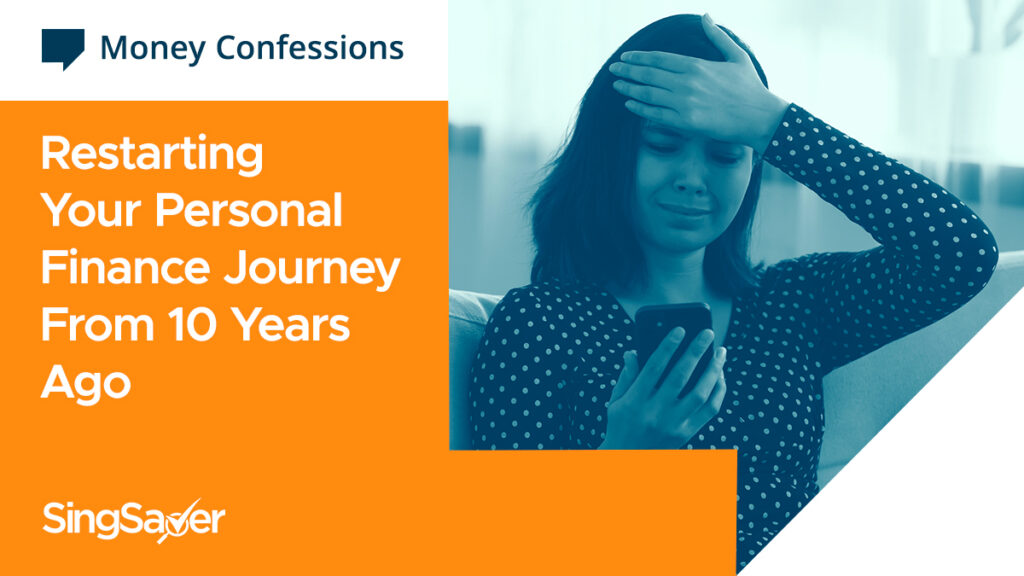
Real stories about money from real people. Money Confessions, a SingSaver series, will excite you, inspire you, and leave you wishing to get financially woke.
What would you do if you could restart your personal finance journey? Learn from our past experiences and avoid making the same financial mistakes.
Looking back at your younger (presumably more carefree) self, what would you have done differently if you could restart your personal finance journey from 10 years ago?
With time and experience, people do grow and wise up. One’s perspective, lifestyle, responsibilities and attitude towards money can change over time.
Here are some of the financial regrets buried deep down in SingSaver staffers’ hearts and memories. We’d like to think of them as valuable lessons learnt.
- Lesson #1: Be more mindful about frivolous expenses
- Lesson #2: Start investing from a young age
- Lesson #3: Don’t neglect essential insurance
- Lesson #4: Save more money
- Lesson #5: Be more savvy about money matters
- Focus on the present and future
Lesson #1: Be more mindful about frivolous expenses
It’s only when we start earning our own money that we realise how hard we have to work for that paycheck at the end of the month.
It is not surprising that we wish we’d practised more mindfulness when splashing out on the little, frivolous expenses that slowly but surely added up over time.
For me, I wasted a tonne of money on blogshop clothes thanks to their neverending new launches. What I should have done differently was to (i) unsubscribe from blogshops’ mailing lists and (ii) not put in the effort to memorise my 16-digit debit card number.
Logan A., 32: “I would have checked myself on frivolous spending on usual suspects like S$6 lattes, ASOS sales, restaurant feasts, late nights at the clubs, cab fares and more.”
Emma, 28: “I would have been more prudent with my spending. In particular, I would have fought harder against peer pressure, stopped chasing shiny, fancy stuff just to ‘fit in', skipped buying Louis Vuitton bag(s) and Gucci wallet(s), and not open bottles at clubs.”
Dusty, 29: “Putting on weight is sort of unavoidable as one ages. I would have cut down on the sheer quantity of clothes bought back then.”
Lesson #2: Start investing from a young age
For most of us, investing wasn’t even something on our to-do list considering we were all pretty young back then. So naturally, we wish we had started investing (or at least Dollar-Cost-Averaging) to take advantage of the magic of compound interest when we had time on our side.
The old adage ‘time is money’ certainly rings true in this context.
If I could restart my personal finance journey, I would have dumped a couple of thousands into the S&P 500 ETF. In hindsight, it was incredibly silly of me to have let my savings rot inside my savings account instead of investing a healthy fraction of it.
Jasmine, 26: “I would have taken whatever money I had, put 50% into S&P 500 and bought Bitcoins with the other 50%. If I had done that, I would be way richer today.”
Cassandra, late 30s: “The longer time horizon would let us ride out the unavoidable bumps in the market better. Having this upper hand would also mean we could take on more risks with our investments instead of shooting for low-risk investments that offer lower returns.”
Logan A.: “I would have read up on the pros and cons of investment-linked plans before committing to one as the fees are mad high. Even though my investment-link plan is performing decently now, it is illiquid if I ever needed emergency funds. If I were to surrender early, I would make a loss. Taking a BTIR approach would have given me way more control.”
I second what Logan A. has shared about investment-linked plans as I’m in the same boat as him. Then again, there weren’t options like robo-advisors or online brokerages with low fees back in the day. While all I wanted was something to help me get the investment ball rolling, I really should have explored other investment options before committing to this long-term policy.
Lesson #3: Don’t neglect essential insurance
What’s another common thread running through SingSaver staffers’ stash of financial regrets? Neglecting insurance when we were younger.
Everyone’s insurance needs are different, though basic ones like whole life insurance, hospital integrated shield plan and critical illness insurance are a necessity for all.
Sophie, 31: “If I could turn back time, I would have gotten coverage for critical illness and early critical illness at an earlier age knowing my family history of illnesses like cancer and heart attack.”
For Cassandra and Xiao Ming, there are clear benefits to getting insured when one is younger and by extension, healthier. The older you are when you sign up for an insurance plan, the more expensive the premiums will be. It may also be more difficult for you to be insured as things like pre-existing conditions and exclusions — issues that are more likely to occur when one gets older — come into play.
Xiao Ming, 31: “I sincerely wish I’d bought more insurance when I was younger because I was later diagnosed with sleep apnea, which contributed to a whole myriad of health problems.
The diagnosis itself rendered me almost uninsurable. I was either rejected or slapped with a huge loading of premiums whenever I wanted a quotation to supplement my current protection policies.
It is better to cancel insurance policies than to regret not being able to buy them to safeguard yourself in the future.”
Lesson #4: Save more money
Back when we were young and free without serious financial liabilities, we didn’t think much about saving money.
Emma: “I would have devoted a portion of my paycheck towards a life insurance policy or a high-yield savings account each time I got paid, instead of using the funds for frivolous expenses.”
Calista, 28: “I wish I’d cultivated a saving habit even with just S$50 monthly when I was 18. Instead, my money funded my sneaker obsession and habit of eating out regularly.”
Entrepreneurial Bernice made decent money off her online blogshop when she was 15. While it’s very commendable and inspiring at the same time, her financial bummer was that she spent it all at the arcade.
Bernice, 25: “If I could turn back time, I would have portioned out my money and saved at least half of it.”
Cassandra: “If I could go back in time, I would “put aside more money for retirement as I had fewer financial responsibilities like mortgages and kids back then. Also, the power of compounding interest would have made a huge difference to my pot of retirement funds, too.”
Want to start saving money? Follow these habits of super frugal people, pronto!
Help yourself to better financial shape in the new norm, with SingSaver's all-new Ultimate Savings Guide! Got your free copy yet?
Lesson #5: Be more savvy about money matters
If we could reboot our personal finance journey, all of us would have taken the liberty and time to learn more about investments, maximise our savings and, really, live and breathe personal finance like there’s no tomorrow.
Besides dipping my toes into investing, I would have stashed away part of my savings in a fixed deposit instead of a regular savings account purely for the sake of earning more interest. Also, a student credit card would have been a better option than plain old debit cards; I wonder how much cashback I’d missed out on.
Ebel, 26: “If I could restart my personal finance journey, I would have comparison-shopped more to get the best price for whatever I wanted to purchase. The savings might be minuscule, but it would have meant a lot for me back when I was 16. I would also have built an expense-tracking habit (very useful!) while building up my personal finance knowledge.”
Sophie: “I prioritised travel, and hence channelled a bulk of my salary (up to 30%) towards my travelling expenses”. To me, exposure, experiences and continued learning are priceless. That was why I made it a point to travel three times a year (usually once to Europe, once to Japan, and once to a Southeast Asian country). However, if I could turn back time, I would have opened a separate bank account and stuck to my budget — it’s difficult not to overspend when one’s immersed in seeing the world, after all! I also went on a one-year sabbatical that ate into my savings drastically (about S$30,000). Looking back, I would have seriously considered a shorter sabbatical and travelled less.”
Ma Jon, 25: “I would have studied harder and gotten all the scholarships possible so I didn’t have to fork out money for my studies. Plus, if I were financially woke back then, I would have gotten my mother to get an endowment plan poised to mature in 2021, which would yield a tidy sum of money by now. That said, I’m pleased to be SingSaver’s resident saving and bargain queen, though.”
Gemma, 30: “I wish I hadn’t locked up my money in three separate endowment plans. I terminated two prematurely last year, which led to a loss of S$10,000.”
Focus on the present and future
There’s no way to turn back time, so don’t beat yourself up over your financial regrets. Our mistakes don’t define us. In Logan A.’s words, “It's 'tuition fees' to enlighten yourself on the crappy relationship you’ve been having with money.”
Keep things in perspective, and work on upping your personal finance game now and in the future. For a start, set achievable financial goals and work towards attaining them. Start building your emergency fund if you haven’t already done so. Spend mindfully, save more money, invest and learn how to use credit cards to your advantage.
Read these next:
Money Confessions: I Became A Million Dollar Roundtable (MDRT) Consultant At 24, And Here’s How I Did It
Money Confessions: I Bought More Than S$700,000 In Critical Illness Coverage While In My 30s—Here’s Why
Money Confessions: Why I Moved Out of My Parents’ House At 24, And How I Afford It
Money Confessions: I Am A Cash Queen And I Went On A Week-Long Cash Cleanse—This Is How It Went
Money Confessions: Super Mums Share Their Personal Finance Management Story
Similar articles
Money Confessions: Super Mums Share Their Personal Finance Management Story
Money Confessions: What’s The Most Singaporean Thing You’ve Done To Manage Your Personal Finances?
Money Confessions: Secrets Your Financial Advisor Won't Tell You
Money Confessions: These 11 Horror Stories Will Get You ‘Woke’ About Your Personal Finance
Money Confessions: The Best Of Dads’ Money Hacks Since The 1970s (and Dad Jokes)
Money Confessions: Top 5 Personal Finance Goals SS Staffers Aim To Check Off In 2022
Money Confessions: How COVID-19 Fixed My Finances
Money Advice You Wish You’d Told Your 18-year-old Self









.png?width=280&name=Investments%20(6).png)